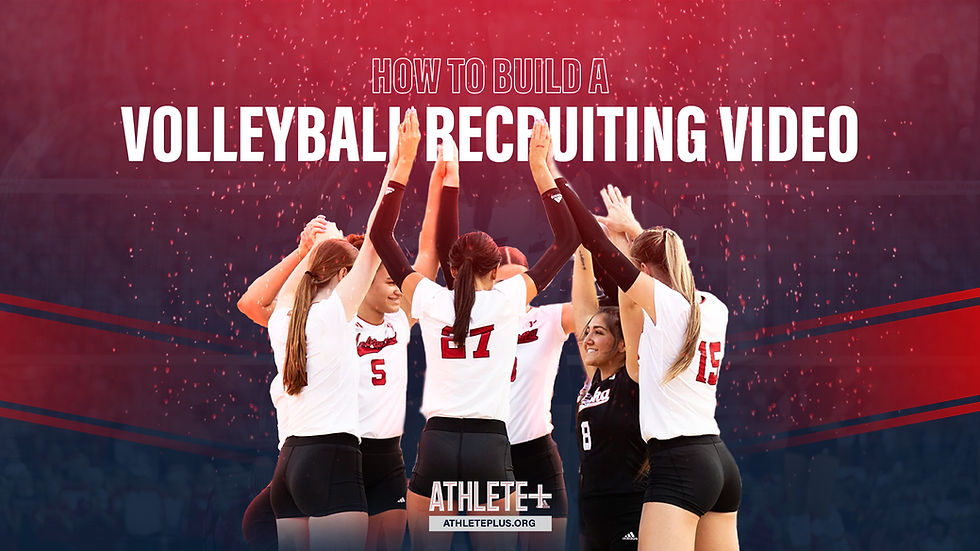How Long is a Volleyball Game? High School vs College, Beach vs Indoor
- Oct 5, 2023
- 4 min read
Updated: Dec 3, 2024
When it comes to college sports, volleyball is a thrilling and competitive game that draws in athletes and fans alike. If you’re considering pursuing an athletic scholarship for volleyball or are simply curious about the sport, one common question that might have crossed your mind is: “How long is a volleyball game in college?” In this article, we will dive deep into the duration of college volleyball games and explore the factors that influence their length.

The Basics of College Volleyball
Before we delve into the specifics of game duration, let’s first understand the basics of college volleyball. College volleyball is played in a best-of-five-set format, meaning the first team to win three sets wins the match. Each set is played to a certain number of points, typically 25 points, but the winning team must have a two-point advantage. In case of a tie at 24-24, the set continues until one team achieves a two-point lead.
Volleyball Set Duration
Now, let’s break down the time it takes to complete one set in a college volleyball game. The duration of a set can vary depending on several factors:
Number of Sets in College Volleyball vs High School Volleyball
The number of sets in a volleyball game significantly impacts its duration. In college volleyball, matches are typically best-of-five sets, while high school volleyball matches are usually best-of-three sets. Each set is played to a certain number of points, typically 25 points, but the winning team must have a two-point advantage. With this format, a typical high school volleyball game can range from 45 minutes to an hour and a half, depending on the competitiveness of the teams and the duration of timeouts.
These differences reflect the competitive demands and intensity of the collegiate level, where games are longer and more challenging, requiring greater stamina and skill. For athletes aspiring to make the jump to college volleyball, understanding and preparing for these nuances is key. Scholarships make it possible to access these advanced levels of competition, and Athlete+ is here to help you secure your spot.
Apply today with Athlete+ and let us guide you toward achieving your collegiate volleyball dreams!

Timestops in Volleyball
Timestops, such as timeouts and injury breaks, can also affect the length of a volleyball game. Coaches strategically use timeouts to regroup their teams, discuss tactics, or disrupt the opponent’s momentum. Injury timeouts, on the other hand, are taken when a player is injured and needs medical attention. These stoppages can add minutes to the overall game time.
Volleyball Match Duration
To determine the overall duration of a college volleyball match, we need to consider the number of sets played. As mentioned earlier, college volleyball matches are best of five sets. This means that, theoretically, a match can conclude in as few as three sets or extend to the maximum of five sets.
On average, a college volleyball match can last anywhere from 90 minutes to 2 hours, including short breaks between sets and any additional factors such as timeouts and televised broadcasts. It’s important to note that exceptionally competitive matches or those with prolonged sets can exceed this average duration.
How Long Is A Beach Volleyball Game?
Beach volleyball games are generally shorter than their indoor counterparts. With just two players on each side and a smaller court, rallies tend to be faster-paced, resulting in quicker game durations. A typical beach volleyball game can last anywhere from 30 minutes to an hour, making it a great option for those seeking a fast and dynamic experience on the sand.

How Long Do Volleyball Tournaments Last?
The duration of volleyball tournaments can vary significantly based on factors such as the number of teams participating, the format of the tournament (single or double-elimination), and the number of matches played in a day. Some one-day tournaments can be completed in a few hours, while multi-day tournaments can span an entire weekend. On average, a weekend tournament might last from one to three days, with each day comprising multiple matches.
In college and high school volleyball, a set typically lasts 20 to 30 minutes, but it can vary based on factors like scoring and timeouts.
The longest volleyball game on record lasted for 75 hours and 30 minutes, played in a recreational setting.
The longest volleyball competition is the “Endless Volleyball” tournament, which lasted for 50 hours and 10 minutes in 2020.
The longest set in volleyball history occurred in 1984 during the Men’s Olympic Games, lasting 78 minutes.
The shortest set in volleyball history lasted just 2 minutes and 6 seconds in a women’s professional volleyball match.
Other Rules In Volleyball
In addition to game duration, understanding the rules of volleyball is crucial for players and fans alike. Here are some other important rules you should be aware of:
Rotations: Players must rotate positions in a clockwise direction each time their team wins a serve.
Substitutions: Teams can make substitutions during dead ball situations.
Scoring: Points are awarded on every rally, with each set typically played to 25 points.
Net Violations: Players cannot touch the net during play.
Libero: A specialized defensive player may be designated as the libero and has certain restrictions.
By understanding these rules, you’ll have a deeper appreciation for the game of volleyball and be better prepared to enjoy it, whether you’re on the court or in the stands. Remember that success in college volleyball goes beyond game duration; it’s about dedication, skill development, and academic excellence. If you’re serious about pursuing a volleyball scholarship, seek guidance and support from experts in the field to maximize your chances of achieving your goals.



